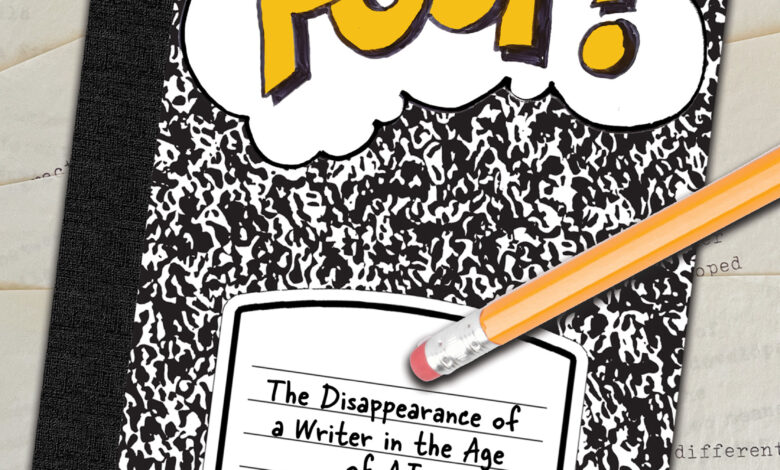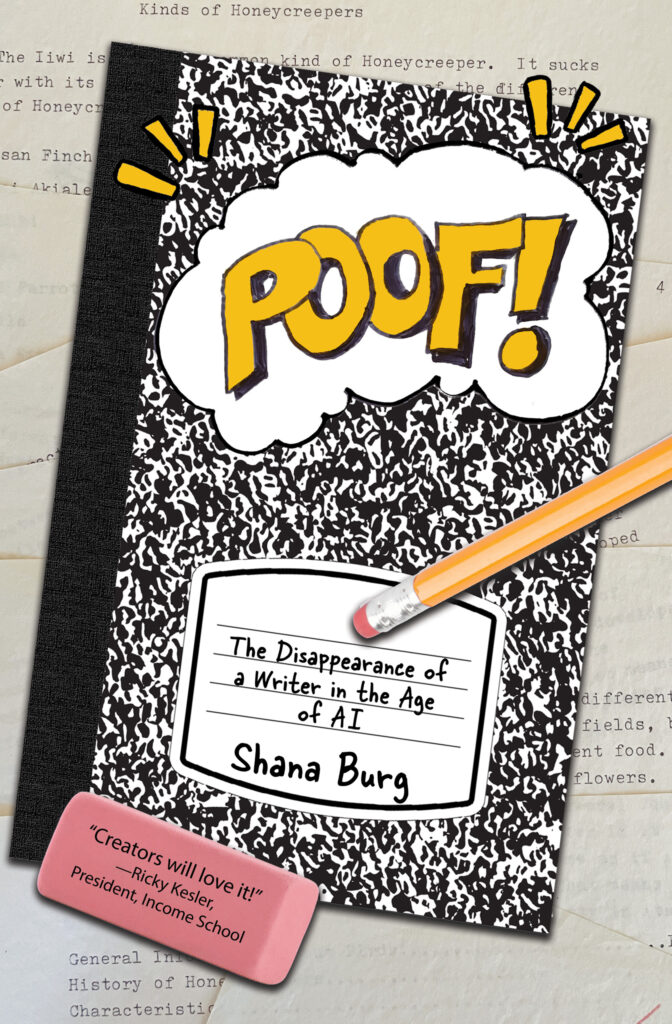How AI Took Away My Writing Career

The following is adapted from Poof! The Disappearance of a Writer In the Age of AI, now available on Bookshop.org, and wherever people sell fine human-written books online.
About two decades ago I began writing my first book: a historical fiction novel set during the civil rights movement.
Sounds serious, right?
My target audience was middle school students. When I say this to authors who write for adults, I’ll often hear something like “Oh, how cute! That must be so fun.”
What they mean is, “That must be so easy!”
Thrillers? Picture books? Romance? It doesn’t matter. A writer is a writer is a writer.
Unless, of course, it’s a machine.
* * *
My first book took eight years from ideation to publication. That’s because I relished in the process, and also because there were no A.I. chatbots ready to help me speed up my work.
In researching the historical setting for my novel, I spent a lot of time getting to the bottom of things.
For example, it’s widely reported online that the Mississippi civil rights activist Medgar Evers had said that “You can kill a man but you can’t kill an idea.”
I wanted to use this quote in my book. But when I tried to figure out where and when Mr. Evers made this statement, I came up short.
I wrote to the Mississippi Department of Archives and History and played phone tag with a guy who worked there. Weeks later, we both suspected it was true: Medgar Evers had never said this at all.
I also spent days on end choosing the best words with which to describe a particular scene. I would pick a word and chew it like a piece of meat. Was it tender enough? Juicy enough? Or should I spit it into my napkin and try another one instead?
Shortly after I published my second novel, cultural policing entered the literary world. Gatekeepers at traditional publishing houses tried to tell authors like me what characters we could and couldn’t write in our works of fiction based on our religion, ethnicity and gender.
Is this what it means to write literary fiction? No thanks. I bailed.
Fast forward to the summer of 2019. Having just been laid off from a tech company, I parked myself at an Austin coffee shop to plan my next move.
I didn’t want to sit in an open-office anymore and have men take note every time I needed to get up and go to the bathroom.
I needed something more freelance-y. More artist-y.
I had the idea that maybe I could learn how to rank content at the top of the Google search results page. That would be a valuable service to offer clients! Who wouldn’t pay me to do that?
So I ordered an almond milk latte, sat down and searched on YouTube: “How do you rank an article on Google?”
This is when I came across two guys who would change my life: Ricky and Jim. They ran a business called Income School. They promised to teach me how to get articles to show up at the top of the Google search results page using something called SEO, or Search Engine Optimization.
Better yet, they said I could make a full-time income (well, 4k+/month) by setting up a blog and following their method. It was perfect! I would use my writing skills to help the universe and make money at the same time. Once I figured it out for myself, I would offer my services to clients.
I immediately signed up for Ricky and Jim’s program and began blogging about my life’s passion: Taking baths.
My new site Bathtubber.com featured articles on chocolate baths, stress-relief baths, oatmeal baths. Soon I expanded to DIY bath products: bath bombs, sugar scrubs, and bubble baths. Then bath mats, shower faucets, and bidets.
To write my blog posts, I optimized for particular keywords, and used SEO-optimization tools to tell me what topics to add to my articles to beat the competition. Let’s say I was writing about the “10 Best Water-Saving Toilets.” The tool might tell me to add information about the “Cost Per Flush” and “Rebates” and “WaterSense label.” And so I’d follow the suggestions and add information about all of these things.
At times, I wondered if what I was doing still counted as writing, because it felt like I was completing a Mad Lib, filling in the blanks to create a story.
Okay, so maybe this wasn’t “real writing,” but at least it was “writing.” After all, I was still picking most of the words for each article myself.
After three years of solid work, my blog Bathtubber was finally taking off! That’s because I learned about affiliate links and how I could make a few cents if I put a link to an Amazon product in one of my posts, and someone clicked the link and bought it. So I added a few affiliate links to a few posts and made a few dollars. Then I added a million affiliate links to a million posts and made a million dollars.
Well, no not a million, but for a few months there, I brought in more than I’d made at any real job I’d ever held. It also helped that we were in the midst of the pandemic, and everyone was hunkered down remodeling their bathrooms.
By the next summer, though, most bloggers like me were no longer “writing” articles at all. Instead, they were “generating.” When OpenAI released ChatGPT in November, 2022, a million users signed up in five days. Over the next year, bloggers increasingly got onboard.
Soon the influencers I followed on YouTube were posting videos like “How I Create 200 Blog Posts in 2 Minutes” by Jesse Cunningham, and “How I Rank 500+ Instant Blog Posts on Google in 3 Weeks” courtesy of SEO Jesus.
Plus, Google was changing its rules and fast. While it wasn’t explicitly against policy to use AI-generated content, it claimed that if an article was unhelpful to the end user and considered spam, then it may not surface in the results at all.
So you needed good AI-generated content. You probably needed to spend a few minutes checking what the tool spit out before you hit the publish button.
* * *
One day last year, I threw up my hands—and while my inner guide screamed, “Don’t!”—I did. I subscribed to an AI tool called Koala and used it to generate about 50 articles for my site.
The content was bland and full of hallucinations, which is when A.I. makes stuff up out of thin air. I would try to fix the mistakes and find little spots where I could inject my voice like a diabetic injecting insulin to restore the patient to health.
A few months after my AI experiment, literally overnight, my traffic plummeted from 110k monthly pageviews to almost nothing.
At first, I was sure the server had gone down. But no. It turned out Google had implemented something called the “Helpful Content Update” which was supposed to surface the most valuable articles to the top of the search results. Instead, it crushed small bloggers in favor of big brands.
For a long time, I followed an influencer named Julia McCoy. She started a content marketing agency, which she exited in 2021 for seven figures. She says she’s incredibly lucky she sold when she did, because so many of the bloggers she knows were obliterated by Google’s “Helpful Content Update.”
Now Julia is president of BrandWell, a company that sells an A.I. tool that generates original, non-plagiarized blog content. The tool can produce 10 to 25 times the output of one human writer. Julia says that you don’t even need a skilled writer to operate the tool, just someone with administrative skills.
* * *
When Bathtubber’s traffic plummeted overnight, the last shred of my writer’s soul fell to the ground like a dead autumn leaf.
Yes, the Google gods decided to drown the world’s preeminent authority on how to take an incredible bath.
But, you may wonder, how is the wider literary world faring in the age of AI? Let’s take a look:
- Seventeen famous fiction authors and the Author’s Guild have filed a class action suit against OpenAI and Microsoft for copyright infringement (aka wholesale theft). The Plaintiffs allege that the datasets OpenAI uses to feed their machines consist of millions of pirated ebooks. As a result, world-renowned authors like Jodi Picoult and Stephen King—and even lesser-known authors like me—are seeing our blood, sweat and tears blended into fortunes for the tech wizards of Silicon Valley, while we watch our own earnings fall off a cliff in the face of this unregulated technology.
- Na-No-Wri-Mo (National Novel Writing Month), a beloved nonprofit organization, runs a challenge every November during which writers across the globe try to draft a 50,000-word novel in just 30 days. But recently the organization released a statement saying that writers could use AI to generate their books. When “real writers” erupted in fury, the organization dug in, stating that AI helps level the playing field for people with disabilities and people who lack access to resources.
- To cut down on the tremendous AI generation of crap books by writers-turned-content creators-turned-machine operators, Amazon Kindle Direct Publishing has now implemented a strict limit on the number of books the same person can upload to sell: only three per day!
* * *
Remember when I said I felt the last shred of my writer’s soul fell to the ground like a dead autumn leaf?
I’m here to say you just may bud again. I did.
I’m making peace with the fact that I’ll probably need to use artificial intelligence to power my day job as a freelance content marketer. I’m taking several online courses about using AI in marketing so that my skills stay fresh.
At the same time, I’m doubling down on the things that speak to my real writer’s heart: I’m looking for an in-person critique group, the type with people who pore over a single sentence for an hour while sipping coffee. The type of group I used to enjoy before the pandemic.
I haven’t found this group yet, but I know it’s out there just waiting for me. In the meantime, when no one’s looking, I’m doing the one thing that no machine can ever do—writing my personal lived experience for no other reason than because I love the feeling of finding the right words to put on the page.
And if you want to read my words, nothing would make me happier. I’ll grow a branch that reaches all the way out to you.

Source link


